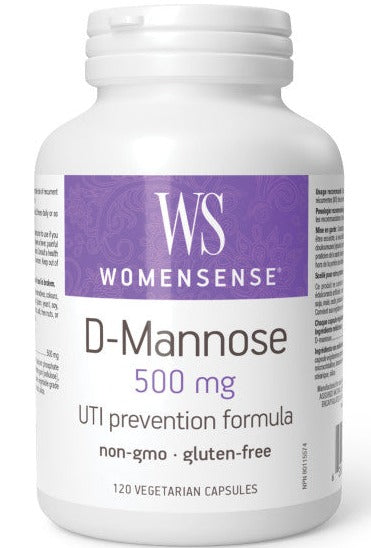D-Mannose 500mg Capsules WomenSense UTI Prevention
D-Mannose 500mg Capsules WomenSense UTI Prevention
Stops UTI infections before they start
Also available as powder
WomenSense D-Mannose uses a formula made with the naturally occurring simple-sugar D-mannose to stop UTI infections before they start. When taken daily, D-mannose helps reduce the risk of recurrent urinary tract infections (UTIs) in women. Each daily dose provides 2000 mg of D-mannose to help flush E. coli from the urinary tract without interfering with healthy blood sugar regulation.
Benefits
- Helps prevent recurrent urinary tract infections (UTIs)
- Targets and naturally flushes E. coli from the bladder
- Prevents bacteria from sticking to the urinary tract wall
- Eliminates urinary pathogens without affecting gut microflora
- Supports a healthy urinary tract
Recommended adult dose: 2 capsules 2 times daily or as directed by a health care practitioner.
Each vegetarian capsule contains:
D-Mannose 500mg
Non-medicinal ingredients: Dibasic calcium phosphate dihydrate, vegetarian capsule (carbohydrate gum [cellulose], purified water), microcrystalline cellulose, vegetable grade magnesium stearate (lubricant), stearic acid, silica.
This product does not contain artificial preservatives, colours, or sweeteners; no dairy, starch, wheat, gluten, yeast, soy, corn, egg, fish, shellfish, animal products, salt, tree nuts, or GMOs. Suitable for vegetarians/vegans.
RESEARCH
More than 50% of all women will have at least one urinary tract infection (UTI) during their lifetime. Of these, around 20–30% will experience recurrent UTIs (Scaglione et al., 2021). Most UTIs (around 85%) are caused by the bacterium Escherichia coliand
are conventionally treated with antibiotics. Although effective, antibiotic use comes with the risk of developing resistance to infectious bacteria and disrupting the body’s intestinal microbiota (Ala-Jaakkola et al., 2022).
D-mannose is a simple sugar found naturally in certain plants and fruits, including cranberries. Unlike many other sugars, it is not metabolized into energy by the body. Studies show that D-mannose stays intact and is rapidly excreted in the urine within 30–60 minutes of being absorbed. As it is flushed out through the urinary tract,
D-mannose works as an anti-adhesive agent that binds to E. coli, preventing it from sticking to the urinary tract wall and causing infection (Scaglione et al., 2021).
In a review of randomized controlled trials, researchers confirmed that D-mannose, when taken alone or in combination with other supplements, significantly reduced the risk of recurrent UTIs in women within six months of treatment. D-mannose has also been shown to provide similar effectiveness as standard therapies used for UTIs,
but with minimal side effects (Lenger et al., 2020).
In a randomized controlled clinical trial, women with a history of recurrent UTIs received either 2000 mg of D-mannose, no therapy, or another standard therapy daily for six months. According to the study, only 15% of the women taking D-mannose experienced a UTI, which was significantly lower than the 61% of women who received
no therapy, and comparable to the 20% of women taking another standard therapy. A key finding of the study was the low (8%) rate of mild side effects experienced by women taking D-mannose compared to 27% of those taking another standard therapy (Kranjčec et al., 2014).
In a clinical study, recurrent UTI patients received antibiotic therapy in combination with one vial containing 500 mg of D-mannose, N-acetyl-L-cysteine, and noni extract twice per day for two months, followed by once daily for four months. As a comparison, an alternate group of recurrent UTI patients received only antibiotic therapy. In a two-month follow-up exam, only 13% of women taking D-mannose were identified with E. coli-positive urine samples, in comparison to 90% of the women taking only antibiotics. Additionally, patients receiving D-mannose experienced a remarkable reduction in urgent incontinence and urinary frequency throughout the study (Marchiori & Zanello, 2017).
The importance of D-mannose as a natural UTI therapy is underscored by the strong relationship between prescription antimicrobial therapies and the development of antimicrobial-resistant bacterial populations in the urinary tract. Evidence shows that this threat is greatest within the first month of antimicrobial treatment, potentially lasting up to one year and adding to the cycle of persistent E. coliinfection (RodriguezMañas, 2020). In some cases, as many as 90% of the E. colistrains infecting patients on antibiotic therapy display resistance after one month (Ala-Jaakkola et al., 2022).
WomenSense Vein Sense


